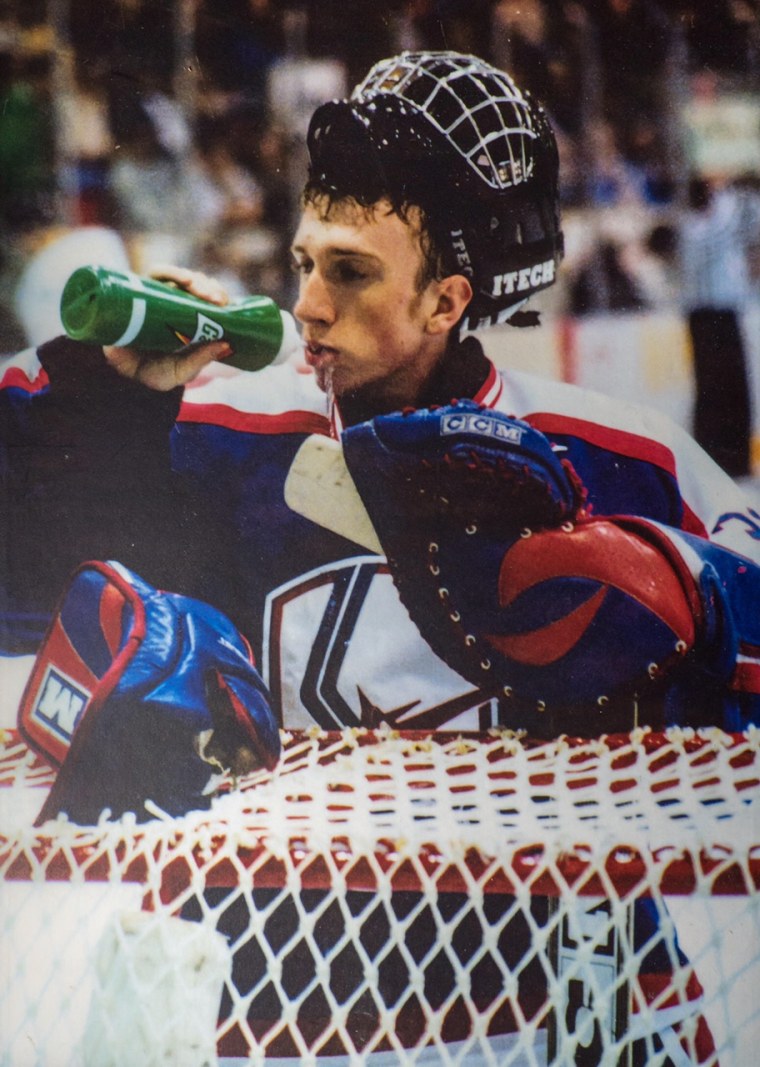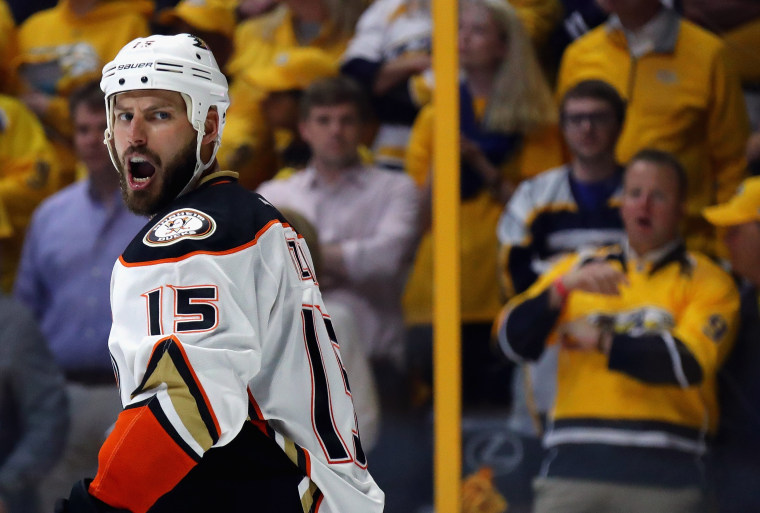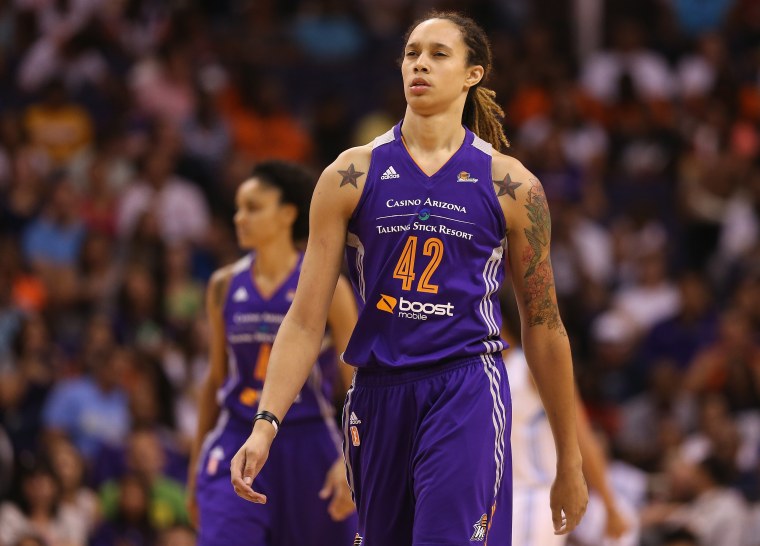As a closeted gay hockey player, it was words and phrases like “that’s gay” and “f-g” in locker rooms growing up that told Brock McGillis he couldn’t play the sport he loved and be open about who he really was at the same time.
“It was scary, it was frustrating, it was sad," he said. "I feared that if I came out I would not have the opportunity to pursue my dream.”

As a semi-professional and university hockey player in Canada and Europe, McGillis was desperate to fit in. So he dated women, suppressed his sexuality and ended up turning to alcohol. Then came the bouts of depression and suicide attempts.
“I knew that if I didn’t make some changes, my life would probably be over," he told NBC Out.
He started dating men in his early 20s, but neither his friends nor family knew he was gay. Then, he met Brendan Burke, the openly gay son of Brian Burke, a famous NHL manager and the former coach of the U.S. men's national ice hockey team. McGillis confided in Burke that he was gay, and Burke offered unique support in McGillis’ life. Months later, Burke died in a car accident.
The 2010 tragedy made McGillis, who was by then retired from playing, realize he needed to fully live his life, so he slowly came out to his family and friends.
A few months after the Orlando nightclub shooting last June, McGillis publicly came out in a sports article in the hopes of providing support to closeted men and women -- particularly athletes.
McGillis was then reminded of why athletes still don’t feel comfortable coming out when a hockey star used a homophobic slur during the NHL playoffs last month.

The Anaheim Ducks’ Ryan Getzlaf was caught on tape seeming to use the word “c---sucker” during the Stanley Cup semi-finals. Getzlaf was given no suspension but fined the maximum allowed -- $10,000. In 2013, he signed an eight-year contract with Anaheim worth $66 million.
A reporter with the Canadian sports channel TSN referred to the term as homophobic, something Getzlaf contested.
“It’s tough to see somebody refer to it as what TSN did. I didn’t mean it in that manner in any way, and for that to go that route was very disappointing for me. I do accept responsibility, and I accept the fine,” Getzlaf told reporters.
LGBTQ advocates said Getzlaf and the league failed in how they handled the incident and need to admit the term is homophobic. McGillis agreed.
“I don’t think that sum of money will mean anything to players that make millions of dollars,” McGillis said, arguing there should be a suspension.
Related: Photo Series Explores 'Sexploitation' in Athletic Uniforms
Helen Carroll, the sports project director for the National Center for Lesbian Rights, said the incident should be used to educate people about what homophobia is.
“Education needs to happen when an incident like that happens, so that [Getzlaf] can understand why the remarks he made afterwards are not an apology and be able to be a little bit more sincere in understanding what he did," Carroll said. "If he doesn’t understand it, he can’t apologize.”
In the same week as Getzlaf’s remark, baseball player Kevin Pillar of the Toronto Blue Jays seemed to yell out “f----t” during a game. Initially, he said, “It’s part of the game,” but he later apologized to the LGBTQ community and was suspended for two games
Last year, a Chicago NHL player was fined $5,000 and suspended for one game after using a homophobic slur. But unlike that player, Getzlaf is the captain of his team and one of the highest scorers in the playoffs.
Ann Pegoraro, an associate professor in sports administration at Laurentian University, believes the decision to not give a suspension was due to business interests. Taking out a star player, she said, may make buying a ticket less attractive.
“We’re talking about a playoff hockey game …. in the United States, which is still pushing to build an audience for hockey," Pegoraro explained.
Homophobia and anti-LGBTQ comments in sports are not limited to men or professional leagues.
In a 2015 study looking at the experiences of gay, lesbian and bisexual people in sports, 80 percent of the 9,500 participants said they witnessed or experienced homophobia in a sporting environment.
But there are signs of progress.
When tennis star Billie Jean King was outed in 1981, she said she lost all her endorsements, and fellow tennis champion Martina Navratilova said she delayed coming out over fears of losing sponsorships.

In contrast, lesbian WNBA star Brittney Griner signed a multi-year contract in March with the Phoenix Mercury, which is expected to make her one of the best paid players in the league. She has also had an endorsement deal with Nike.
Brian Kitts, the president of You Can Play, and organization that promotes LGBTQ equality in sports, said when his organization goes to speak at colleges, many students already know teammates who are out.
“There is a very definite generational shift," he said. "It doesn’t affect younger athletes the way that it does older athletes; they’re much more use to the idea.”
Related: Sports Organizations Across US Help Out Athletes Thrive
McGillis sees this progress in his own work as a trainer to young athletes in his hometown of Sudbury, north of Toronto.
After publicly coming out last year, former teammates got back in touch with him to lend support. Athletes he trained and their families have given positive feedback -- even trying to set him up on dates.
“Do some athletes not want to work with me because of my sexuality? Probably. Do I care today? Absolutely not," he said. "I would rather spend my time helping those who need help or working with those who see me for me than focus on those who might not like me based on my sexuality.”